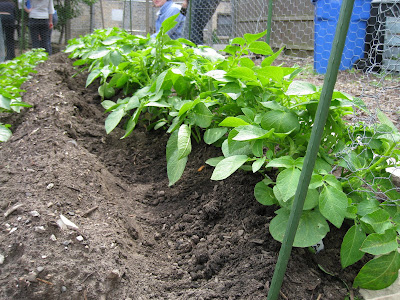On Saturday June 6, Ginkgo hosted a happy bunch of enthusiastic volunteers (including a Chicago Cares crew), who tirelessly harvested, weeded, sowed, planted and mulched things into order.

Our second harvest of the season included the rest of the
radishes, more
spinach,
chard,
collards and
kale, two heads of
lettuce, and assorted
herbs.

With the harvest in, we moved on to various maintenance activities. One team earthed up the
La Ratte fingerling potatoes (half a bed, plus the overflow in pots and the bathtub). The principle is to raise the soil around the growing potato plants to encourage them to generate more roots and less foliage.


Another team tidied the
raspberry canes. And given the continued cool nights, we also blanketed the
sweet potatoes with row cover. Much weeding was done in many locations. Benefiting from the advice of Ginkgo co-founder Eric, in town for a rare visit, we mustered enough courage to take out the sickly old boughs of the
smoke tree to the left of the front gate, in the hope that some of the healthy shoots at the base will produce strong new trunks.
In a re-enactment of a scene from
My Ántonia we also dispatched volunteers to trade growing stock with neighboring homesteads. Alan returned first of all with a bountiful selection of unusual varieties of organic
tomatoes from Rogers Park. We needed these to supplement our home-grown plants which have struggled in this
spring's cold and damp.
Meanwhile, Doug trekked across the
flatlands to
Barrington to pick up the long awaited allotment of
prairie plants from
Native Seed Gardeners, a seed saving program associated with the the Chicago Botanic Garden. I think we had all envisaged getting something more than the six small plugs that they were able offer us. Apparently they have received lots of interest from local gardeners in their program, which is great. However, it
looks like we set our expectations a little high. We're definitely going to need to purchase many more plants if we're ever going to have anything like a prairie garden.

Undeterred, we made a start on increasing our prairie
plantstock by sowing
Echinacea purpurea (purple
coneflower),
Echninacea angustifolia (prairie
coneflower) and
Rudbeckia hirta (one of the many plants called black-eyed
susan) in parts of three beds at the west end of the garden.

Back with the vegetables, three of the remaining beds were quickly consumed by all sorts of squash:
zucchini,
acorn squash, two types of
pumpkins, and
Armenian cucumbers (strictly speaking, a weird melon). In the next bed, we finally discovered a use for the reclaimed
papasan frame which has now been
repurposed as a climbing frame for
pole beans.
We finished up the session by inoculating our first bed for
Wine Cap stropharia mushrooms. We're going to take two approaches with these. Today's was to mix half the sawdust spawn into a dampened 4-inch deep bed of 75% wood chips and 25% compost, spread out under one of the plum trees. With some more compost/chips mixture on top and a light straw mulch, this should provide the ideal growing medium. Next week, we'll try the other approach, inoculating a bed of
pre-soaked straw.

[Photos courtesy of Dave Short]


















